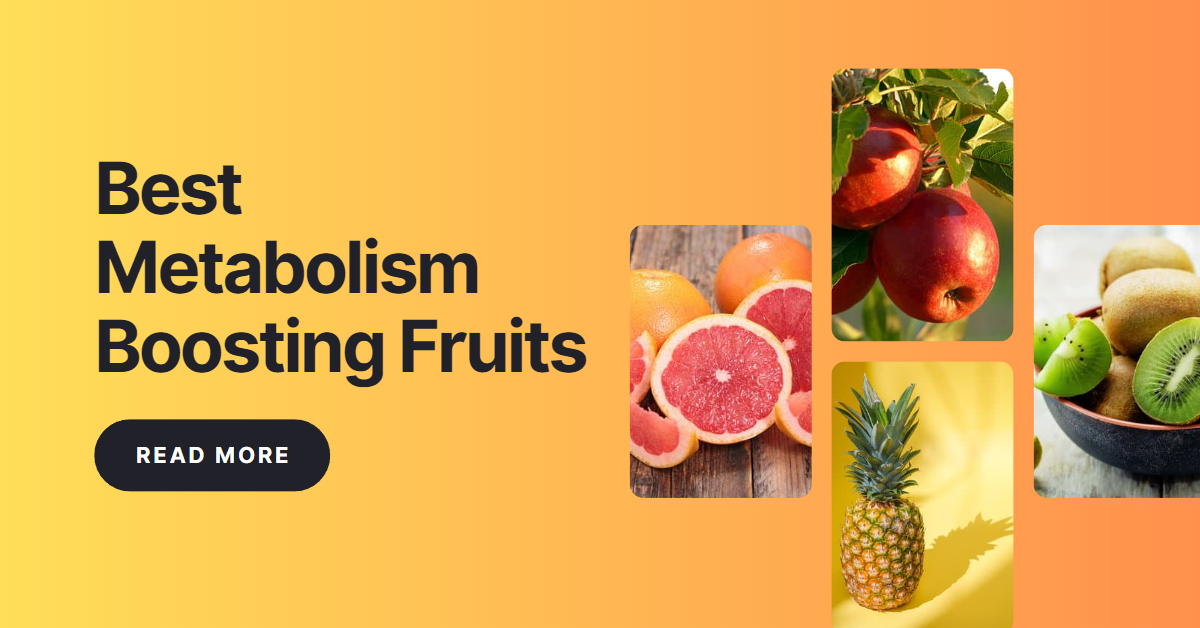Metabolism is a vital process in our body that converts the food we eat into energy. A faster metabolism can help you burn more calories, which in turn can aid in weight loss. While regular exercise and a balanced diet can help improve your metabolism, certain fruits can also play a crucial role in boosting your metabolism. In this article, we’ll discuss the best metabolism-boosting fruits that you can easily incorporate into your diet.
Grapefruit:
Grapefruit is an excellent fruit that can help you kickstart your metabolism. It contains a compound called naringenin, which has been found to help increase the body’s metabolic rate. Additionally, grapefruit is a low-calorie fruit that can make you feel full and satisfied, thus preventing overeating.
Apples:
Apples are another metabolism-boosting fruit that can help you lose weight. They are high in fiber and low in calories, which makes them an ideal snack for those looking to lose weight. Apples also contain a compound called ursolic acid, which has been shown to increase muscle mass and decrease body fat.
Pineapple:
Pineapple is a tropical fruit that is packed with nutrients and enzymes that can help boost your metabolism. It contains an enzyme called bromelain, which aids in digestion and helps break down protein. Pineapple is also high in vitamin C, which can help improve your immune system.
Kiwi:
Kiwi is a small but powerful fruit that can help improve your metabolism. It is high in fiber and low in calories, which makes it a great option for those looking to lose weight. Kiwi is also an excellent source of vitamin C, which can help improve your immune system.
Oranges:
Oranges are another excellent fruit that can help boost your metabolism. They are high in vitamin C, which can help improve your immune system. Oranges are also low in calories and high in fiber, making them an ideal snack for those looking to lose weight.
Pears:
Pears are a great source of fiber, which can help improve digestion and boost your metabolism. They are also low in calories and high in water content, which makes them a great option for those looking to lose weight.
Watermelon:
Watermelon is a refreshing fruit that can help improve your metabolism. It is high in water content, which can help keep you hydrated and improve digestion. Watermelon is also low in calories and high in vitamin C, which can help improve your immune system.
Guava:
Guava is a tropical fruit that is packed with nutrients and antioxidants. It is high in fiber and low in calories, making it an ideal snack for those looking to lose weight. Guava is also an excellent source of vitamin C, which can help improve your immune system.
Mango:
Mango is a delicious tropical fruit that can help improve your metabolism. It is high in fiber and low in calories, making it a great option for those looking to lose weight. Mango is also an excellent source of vitamin C, which can help improve your immune system.
Incorporating these metabolism-boosting fruits into your diet may assist in losing weight and improve your overall health. These fruits are not only nutritious but also low in calories, making them an ideal snack option for those looking to lose weight. It’s important to note that while these fruits can help improve your metabolism, they should not be used as a substitute for a balanced diet and regular exercise. A healthy lifestyle that includes a variety of fruits, vegetables, whole grains, and lean proteins is key to maintaining a healthy weight and improving overall health. So, start incorporating these delicious metabolism-boosting fruits into your daily diet today and enjoy the many health benefits they have to offer!
Citation List
- Gorinstein S, Caspi A, Libman I, Lerner HT, Huang D, Leontowicz H, et al. Red grapefruit positively influences serum triglyceride level in patients suffering from coronary atherosclerosis: studies in vitro and in humans. J Agric Food Chem. 2006;54(5):1887-1892. doi:10.1021/jf0515721
- Jung UJ, Choi M-S. Obesity and its metabolic complications: the role of adipokines and the relationship between obesity, inflammation, insulin resistance, dyslipidemia and nonalcoholic fatty liver disease. Int J Mol Sci. 2014;15(4):6184-6223. doi:10.3390/ijms15046184
- Adisakwattana S, Lerdsuwankij O, Poputtachai U, Minipun A, Suparpprom C. Inhibitory activity of cinnamon bark species and their combination effect with acarbose against intestinal α-glucosidase and pancreatic α-amylase. Plant Foods Hum Nutr. 2011;66(2):143-148. doi:10.1007/s11130-011-0223-3
- Kalra S, Jena BN. Protective role of ursolic acid in ameliorating the obesity-mediated oxidative stress through antioxidant mechanisms. J Cell Biochem. 2018;119(6):4473-4484. doi:10.1002/jcb.26663
- Vendrame S, Daugherty A, Kristo AS, Riso P, Klimis-Zacas D. Wild blueberry (Vaccinium angustifolium) consumption improves inflammatory status in the obese Zucker rat model of the metabolic syndrome. J Nutr Biochem. 2013;24(8):1508-1512. doi:10.1016/j.jnutbio.2012.12.013
- Peake JM, Suzuki K. Co-ingestion of carbohydrate and protein during prolonged endurance exercise: sufficient evidence for benefit? Sports Med. 2020;50(3):535-547. doi:10.1007/s40279-019-01233-w
- Lee JW, Lee YK, Ban JO, et al. Anti-inflammatory and anti-allergic effects of kiwifruit cysteine protease actinidin in murine model. Mol Nutr Food Res. 2010;54(8):1151-1160. doi:10.1002/mnfr.200900384
- Ohta H, Ni JW, Matsumoto A, et al. Watanabe Fruit juice clinical trial II: glycemic control in diabetic patients by guava juice intake. J Nutr Sci Vitaminol (Tokyo). 2005;51(6):413-418. doi:10.3177/jnsv.51.413
- Ettiene OK, Afolayan AJ, Moyo B. Effect of mango (Mangifera indica L.) consumption on glycemic control: a systematic review and meta-analysis. Phytother Res. 2020;34(9):2289-2297. doi:10.1002/ptr.6747
- Masibo M, He Q. Mango bioactive compounds and related nutraceutical properties: a review. Food Rev Int. 2008;24(2):189-204. doi:10.1080/







